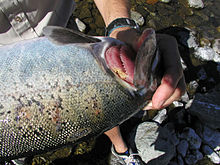Flavobacterium columnare is a thin Gram-negative rod bacterium of the genus Flavobacterium. The name derives from the way in which the organism grows in rhizoid columnar formations.[2]
| Flavobacterium columnare | |
|---|---|

| |
| Scientific classification | |
| Domain: | Bacteria |
| Phylum: | Bacteroidota |
| Class: | Flavobacteriia |
| Order: | Flavobacteriales |
| Family: | Flavobacteriaceae |
| Genus: | Flavobacterium |
| Species: | F. columnare
|
| Binomial name | |
| Flavobacterium columnare (Bernardet and Grimont 1989) Bernardet et al. 1996[1]
| |
The species was first described by Davis (1922), and the name was validated by Bernardet and Grimont (1989).[3]
Flavobacterium columnare can be identified in the laboratory by a five-step method that demonstrates:
- the ability to grow on a medium containing neomycin and polymyxin B
- production of yellow pigmented rhizoid (root-like in appearance) colonies
- production of a gelatin-degrading enzyme
- binding of Congo red dye to the colony
- production of a chondroitin sulfate-degrading enzyme[4]
The species has been known previously as Flexibacter columnaris, Bacillus columnaris, and Cytophaga columnaris.
Flavobacterium columnare is one of the oldest known diseases among warm-water fish, and manifests itself as an infection commonly known as columnaris. Infections are the second leading cause of mortality in pond raised catfish in the southeastern United States.[4] Early treatment with potassium permanganate has been shown to increase survival rate, although the difference was not statistically significant.[5]
References
edit- ^ Parte, A.C. "Flavobacterium". LPSN.
- ^ Declercq, Annelies Maria; Haesebrouck, Freddy; Van Den Broeck, Wim; Bossier, Peter; Decostere, Annemie (2013). "Columnaris disease in fish: A review with emphasis on bacterium-host interactions". Veterinary Research. 44 (1): 27. doi:10.1186/1297-9716-44-27. PMC 3648355. PMID 23617544.
- ^ Bertolini, J. M.; Rohovec, J.S. (1992). "Electrophoretic detection of proteases from different Flexibacter columnaris strains and assessment of their variability". Diseases of Aquatic Organisms. 12: 121–128. doi:10.3354/dao012121.
- ^ a b Durborrow, RM; Thune, RL; Hawke, JP; Camus, AC (1988). "Columnaris Disease - A Bacterial Infection Caused by Flavobacterium columnare" (PDF). SRAC Publication (479). Retrieved 10 July 2016.
- ^ Darwish, A M; Mitchell, A J; Straus, D L (2009). "Evaluation of potassium permanganate against an experimental subacute infection of Flavobacterium columnare in channel catfish, Ictalurus punctatus (Rafinesque)". Journal of Fish Diseases. 32 (2): 193–199. doi:10.1111/j.1365-2761.2008.01015.x. ISSN 0140-7775.
External links
edit